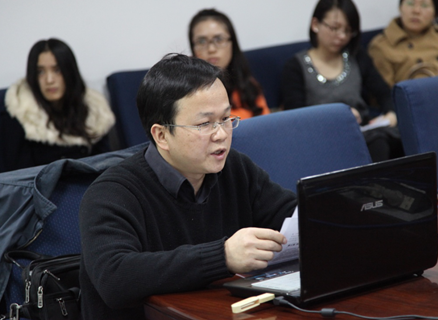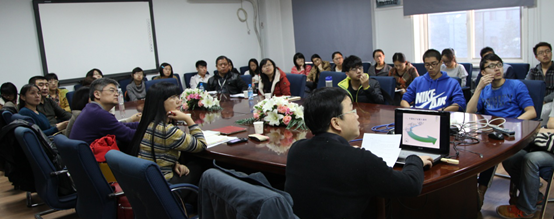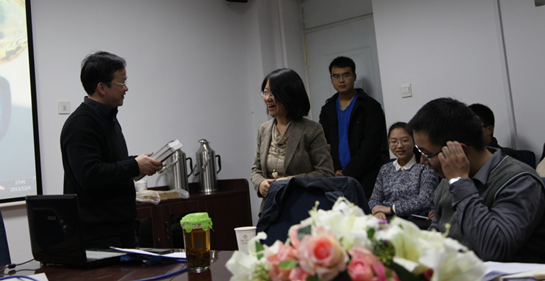
Dec . 09, 2013
A seminar focused on electronic evidence was held at SIRM of RUC, December 4th, 2013. Dr. Pinxin Liu from
Law School at RUC was invited to give a short lecture on the basics of electronic evidence and its
development.
The seminar was chaired by Prof. Jian Wang,Assistant Dean of SIRM. Prof. Yuenan Liu, Deputy Dean of SIRM,
and Mr. Shuilong Tao from Beijing Municipal Archives, along with Prof. Xuejun Li and Prof. Bo Zhang from
the School of Statistics of RUC, attended the meeting. Faculty members and students from both SIRM
and the School of Statistics also joined the discussion.
After Prof. Jian Wang’s warm welcome remark, Dr. Liu began his lecture by covering the basic history
of electronic evidence in China, elaborating on some of the most important milestones of its
development. From the first case in China employing e-mail as evidence in 1996, to the promulgation
of the Law of the PRC on Electronic Signature in 2004, and to the recent case on Xilai Bo, Dr. Liu vividly
illustrated how electronic evidence gradually became an important branch of evidence in court and
established its current position.
Next, Dr. Liu addressed some of the main issues concerning digital evidence.
The first one is the characteristics of electronic evidence when compared to traditional
evidence. A consensus has been reached in the law area that electronic evidence is unique in
its internationality and vituality, which raises various difficulties in employing such evidence.
The second is how to analyze electronic evidence from a systematic view. Dr. Liu gave examples
on how electronic evidence are usually not individual pieces of evidence, but rather a full
system of large amounts of evidence closely related to each other. Courts need to consider
not only the content of the evidence, but also large quantities of related background information
generated during the process of the creation of such evidence.
The third one raises the question of whether electronic evidence is prone to falsification, and
the answer from the law area is probably no. Due to the complexity of digital evidence, it would
almost be impossible to tamper with it without leaving a single trace.
The final problem is how to understand electronic evidence in a rational way. Dr. Liu used
further examples to explain this problem, and shared the viewpoint that electronic evidence is
like the tip of an iceberg: the main part of it is still in deep waters which requires further
research.
After discussing the main problems concerning digital evidence, Dr. Liu moved on to the topic
of institutional constructions of the implementation of electronic evidence in China. Discussing
each aspect of institutional construction in detail, and giving more information on how the
relevancy, authenticity, validity and credibility of electronic evidence influences such constructions,
Dr. Liu believes that China needs to stress the importance of establishing a solid and creative
institutional environment for employing digital evidence.
Finally, Dr. Liu shed some light on how electronic evidence might develop in the future. In China,
the research on electronic evidence is delving deeper, and the focus is shifting to the
establishment of related systems and institutional frameworks.
A Q&A session proceeded after the lecture. Various students and teachers raised their own
questions and had some further discussions on the topic.
At the end of the seminar, Prof. Yuenan Liu and Prof. Jian Wang presented gifts to Dr. Liu,
promising further collaboration in the future.
(Reported by Ruohua Han,Photo by Xuelian Wang and Yanguo Ren)
- Faculty from the School of Information Resource Management attended 2023 Annual Meeting of the International Electrotechnical Commission’s Smart City System Committee
- Faculty and Students of the School of Information Resources Management participate in the 2023 ICA International Congress on Archives
- The 20th China Information Resources Management Forum and the Inaugural Meeting of the Autonomous Knowledge System Alliance for Information Resources Management Discipline in China were successfully held
- Faculty and students of the School of Information Resource Management participated in iConference 2023
- The international publication of papers from the School of Information Resource Management (SIRM) at Renmin University of China, by teachers and students since June 2022
- Dr. Liang Jihong Lectured Online in Special Training Camp Series of Digital Memory
- Symposium on Community Informatics (CI) in Digital China was held by SIRM
- Associate Professor Rony Medaglia from Copenhagen Business School Gave A Cutting Edge Lecture: Digital Transformation in Government
- “Digital Memory” Beijing Nursery Rhyme Group was elected as the Outstanding Team of “Historical Town, Traditional Business, Celebrities, Scenaries Presevation Cooperation Programme” in Xicheng District in 2018
- Board Chairman of “digital project” gave advice to the students pioneering business





